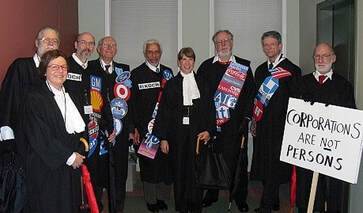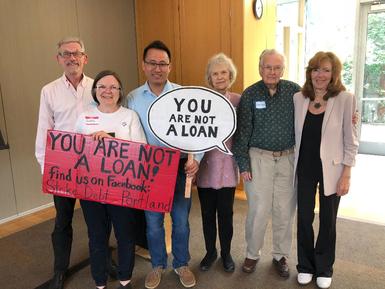authoritarian regimes.
by Dave Lewit
The handwriting is on the wall. Centrist President Joe Biden notwithstanding, disaffected millions of Americans seem willing to consider the likes of Donald Trump in the 2024 election. Can pro-democracy Americans prevail?
Harvard political scientists Erica Chenoweth and Zoe Marks are not sure. They want pro-democracy people and sympathizers to be prepared and active. Their 34-page comprehensive, no-nonsense October 2022 report Pro-Democracy Organizing against Autocracy in the United States: A Strategic Assessment & Recommendations is essential and practical.
Chenoweth is well qualified: she and colleagues studied 323 significant twentieth century (1900-2006) revolutionary movements worldwide, finding that nonviolent movements succeeded twice as often as violent armed movements against armed authoritarian regimes. But supporting authoritarian regimes are “corporations, business and economic elites, media, party officials and staff, civil servants, security personnel, cultural influencers, foundations and philanthropists, religious leaders, organized labor, and other elite and local authoritarians.”
Drawing on their scrutiny of these nonviolent pro-democracy, revolutionary movements,
Chenoweth and Marks prescribe actions in four essential categories:
- Build and maintain a large-scale, multiracial, cross-class, pro-democratic United Front;
- Protect, hold, and build local and community power through alternative institutions;
- Build pressure to induce defections among autocrat loyalists;
- Strengthen resilience against increased state “security” or paramilitaries.
Wow, a tall order! The authors then go into important details for each action. These are helpful because they can engage the talents and drives of the mere five percent necessary for a winning movement, who otherwise might despair of the complexity of effective organized activity. Broadly, a United Front “will require a general secretariat with a federated structure. . . a resource bank that can fund legal support, strike relief . . . and other support for chapters to organize and mobilize people.” It should “develop intelligence, community power building, scenario planning, communications, education, training, conflict resolution, and diplomacy.”
Where to begin? First may be calling out illegal, mendacious, and antisocial behavior by authorities’ agents. When too many municipal and state institutions become controlled by a system of white-only, law-and-order, elitist officers and their favored institutions, people seek companionate support. Some nonprofit organizations can help, but face-to-face, left/populist, movement groups—anti-corporatist, ecological, localist, anti-racist, police-reforming, anti-sexist, pro-immigrant, anti-war, socialist—may be more amenable to “intersectionality’s” call for collaboration, and form alternative institutions.
As corporate and government institutions depend more and more on digital controls, physical proximity of local people may encourage “economic cooperatives, fresh food provision, public health institutions, mutual aid, community safety, strike funds, and other forms of cooperation that dramatically reduce the reach, impact, and legitimacy of the authoritarian state.” To promote defections they emphasize “mapping” of authoritarians’ structures and networks to identify key persons and links to overlapping neutral or pro-democracy groupings. Partnering with foreign resistance groups can provide moral authority for local movements, partly by engaging certain international agreements.
But Chenoweth and Marks outline so much more than we can discuss here. For the short and longer terms we must survey what resistance structure we have, and quickly build a more deliberate, comprehensive “pro-democracy infrastructure.”
We know that our movement, our United Front, must be nonviolent. Mahatma Gandhi’s nonviolent movement was top-down — personally driven. Politically, it failed. He had heart and drive, but lacked social infrastructure. Martin Luther King had Gandhi’s drive, and engaged existing organizations like churches as rudimentary infrastructure. Chenoweth and Marks offer a spreadsheet with dozens of critical infrastructure elements, but lack participatory fire — drive, staging, and progressive dynamism. A Trumpist president in 2024 may be a slap in the face — a sting for serious infrastructure building.
Dave Lewit is Professor Emeritus and frequent contributor to Justice Rising. He is the Ombudsman of the Alliance for Democracy.



 RSS Feed
RSS Feed
